Other Books in the Eric Voegelin Series in Political Philosophy
America and the Political Philosophy of Common Sense, by Scott Philip Segrest
Beginning the Quest: Law and Politics in the Early Work of Eric Voegelin, by Barry Cooper
How World Politics Is Made: Franois Mitterand and the Reunification of Germany, by Tilo Schabert
Worldview and Mind: Religious Thought and Psychological Development, by Eugene Webb
Rethinking Rights: Historical, Political, and Philosophical Perspectives, edited by Bruce P. Frohnen and Kenneth L. Grasso
The Philosopher and the Storyteller: Eric Voegelin and Twentieth-Century Literature, by Charles R. Embry
The Constitutionalism of American States, edited by George E. Connor and Christopher W. Hammons
Voegelin Recollected: Conversations on a Life, edited by Barry Cooper and Jodi Bruhn
The American Way of Peace: An Interpretation, by Jan Prybyla
Faith and Political Philosophy: The Correspondence between Leo Strauss and Eric Voegelin, 19341964, edited by Peter Emberley and Barry Cooper
New Political Religions, or an Analysis of Modern Terrorism, by Barry Cooper
Art and Intellect in the Philosophy of tienne Gilson, by Francesca Aran Murphy
Robert B. Heilman and Eric Voegelin: A Friendship in Letters, 19441984, edited by Charles R. Embry
Voegelin, Schelling, and the Philosophy of Historical Existence, by Jerry Day
Transcendence and History: The Search for Ultimacy from Ancient Societies to Postmodernity, by Glenn Hughes
Eros, Wisdom, and Silence: Plato's Erotic Dialogues, by James M. Rhodes
The Narrow Path of Freedom and Other Essays, by Eugene Davidson
Hans Jonas: The Integrity of Thinking, by David J. Levy
A Government of Laws: Political Theory, Religion, and the American Founding, by Ellis Sandoz
Augustine and Politics as Longing in the World, by John von Heyking
Lonergan and the Philosophy of Historical Existence, by Thomas J. McPartland
The Eric Voegelin Institute Series in Political Philosophy: Studies in Religion and Politics
Etty Hillesum and the Flow of Presence: A Voegelinian Analysis, by Meins G. S. Coetsier
Christian Metaphysics and Neoplatonism, by Albert Camus; translated with an introduction by Ronald D. Srigley
Voegelin and the Problem of Christian Political Order, by Jeffrey C. Herndon
Republicanism, Religion, and the Soul of America, by Ellis Sandoz
Michael Oakeshott on Religion, Aesthetics, and Politics, by Elizabeth Campbell Corey
Jesus and the Gospel Movement: Not Afraid to Be Partners, by William Thompson-Uberuaga
The Religious Foundations of Francis Bacon's Thought, by Stephen A. McKnight
Politics Reformed: The Anglo-American Legacy of Covenant Theology, by Glenn A. Moots
Eric Voegelin and the Continental Tradition
Explorations in Modern Political Thought
Edited by Lee Trepanier and Steven F. McGuire
University of Missouri Press
Columbia and London
Copyright 2011 by
The Curators of the University of Missouri
University of Missouri Press, Columbia, Missouri 65201
Printed and bound in the United States of America
All rights reserved
5 4 3 2 1 15 14 13 12 11
Cataloging-in-Publication data available from the Library of Congress
ISBN 978-0-8262-1910-7
ISBN 978-0-8262-7238-6 (electronic)
 This paper meets the requirements of the American National Standard for Permanence of Paper for Printed Library Materials, Z39.48, 1984.
This paper meets the requirements of the American National Standard for Permanence of Paper for Printed Library Materials, Z39.48, 1984.
Design and composition: Jennifer Cropp
Printer and binder: Integrated Book Technology, Inc.
Typefaces: Minon, Warnock Pro, and Handwriting -Dakota
Publication of this book has been assisted by a contribution from the Eric Voegelin Institute, which gratefully acknowledges the generous support provided for the series by the Earhart Foundation and the Sidney Richards Moore Memorial Fund.
To our better halves, MiJung and Elizabeth-Jane
Contents
Lee Trepanier and Steven F. McGuire
Thomas W. Heilke
Cyril O'Regan
Steven F. McGuire
Eugen L. Nagy
Rouven J. Steeves
Arpad Szakolczai
David Walsh
Fred Lawrence
Barry Cooper
Lee Trepanier
Introduction
Lee Trepanier and Steven F. McGuire
Conscious reflection on the philosophical foundations of Western civilization has increased steadily since Descartes, and especially since the middle of the twentieth century with its growing concerns about the possible collapse of modernity. The Enlightenment confidence in human reason's ability to understand and convey the fundamental structure of reality has been shaken by the advent of revolutionary political movements, totalitarian ideologies, and the philosophical skepticism of postmodernity. Perhaps this should not be surprising given the modern restriction of knowledge to the external and empirical sphere of reality, which was made possible by Cartesian subjectivism and then subsequently legitimated by the methods of the natural sciences. Ours is a truncated reason. The experiences of God, morality, and the other transcendent teleologies that constitute human existence are no longer allowed the status of knowledge in this Cartesian world. Instead, they are seen as private and often suspect beliefs.
Eric Voegelin (19011985) is one of the severest critics of this Cartesian subjectivity, its successive philosophical practitioners, and its political and philosophical consequences. For Voegelin, modernity was fundamentally characterized by man's attempt to refashion the world in his own imagean attempt that ultimately was doomed to failure, but was nonetheless enacted at the price of millions of lives. This failure was perhaps best exemplified by the rise of National Socialism, but it could only occur in a civilization that had fallen into a spiritual and intellectual malaise. As Voegelin notes, The phenomenon of Hitler is not exhausted by his person. His success must be understood in the context of an intellectually or morally ruined society in which personalities who otherwise would be grotesque, marginal figures can come to public power because they superbly represent the people who admire them. Near the end of the twentieth century, Voegelin thought that modernity's ruin had not only pervaded all aspects of society but run its course. What was required was a new philosophya new sciencethat would restore a proper understanding of reality and reestablish a basis for its communication.
Voegelin thought that the modern philosophical trajectory was implicated in and partly responsible for the crisis of modernity, and thus he sought his philosophical bearings among the premodern philosophers. Yet Voegelin's relationship to modern philosophy is not wholly negative, and the essays in this volume reevaluate Voegelin's critique of modernity by examining his relationship to the continental tradition of philosophy from Kant to Derrida. Although Voegelin is often critical of many of the thinkers in the modern tradition of philosophy, it is the premise of this volume that he nevertheless has much more in common with them than is usually recognized. We think it is important to recognize this because we suspect that Voegelin's own attempt to grapple with the crisis of modernity would have been aided by a friendlier consideration of these other thinkers. In short, we want to go beyond Voegelin's criticisms of these thinkers and to explore, from a fresh point of view, how Voegelin's search for order can be enriched by a more sympathetic reading of their works. What commonalities can be found between Voegelin and the others? What contributions can both Voegelin and the other modern philosophers make in our understanding of both the crisis of modernity and the path beyond it? But before we explore these questions, who was Eric Voegelin, and what were his criticisms of modernity?

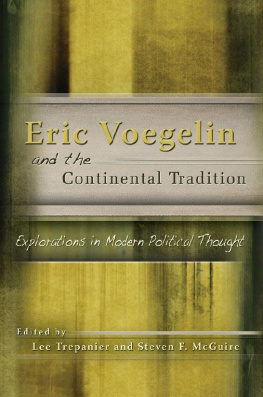
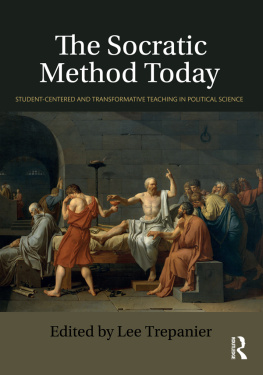
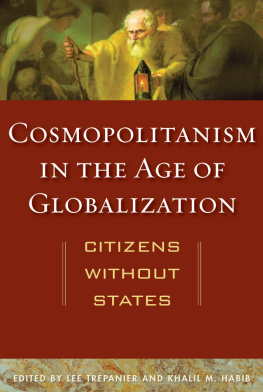

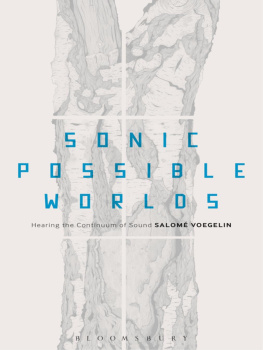
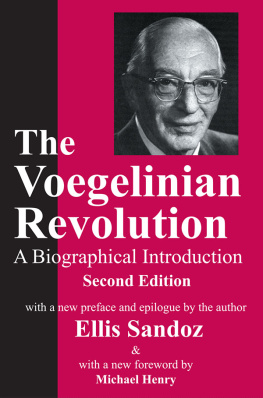

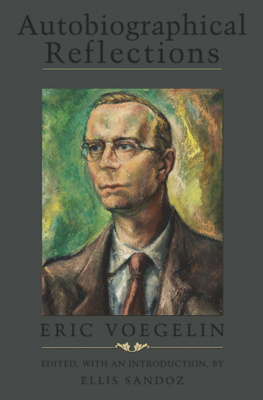
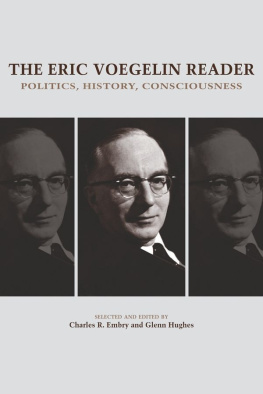
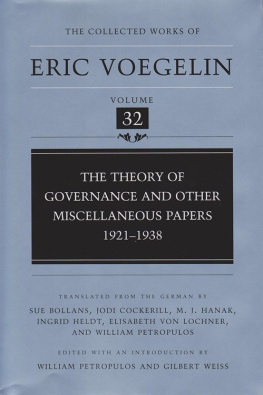
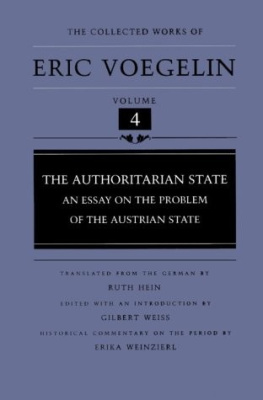
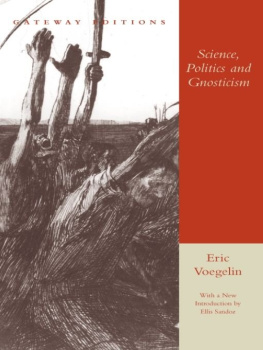
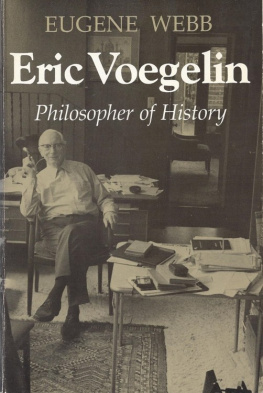
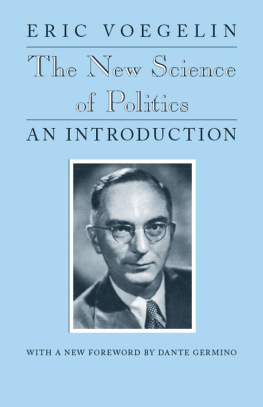
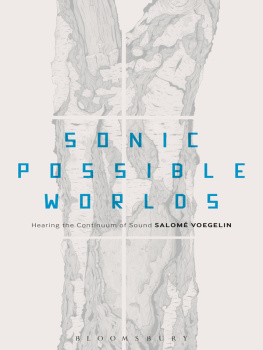
 This paper meets the requirements of the American National Standard for Permanence of Paper for Printed Library Materials, Z39.48, 1984.
This paper meets the requirements of the American National Standard for Permanence of Paper for Printed Library Materials, Z39.48, 1984.